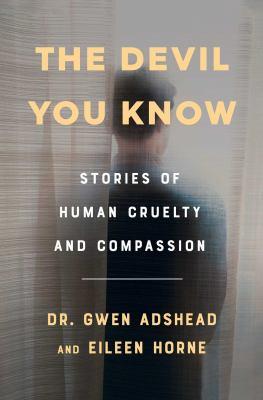
The devil you know : stories of human cruelty and compassion
Available Copies by Location
| Location | |
|---|---|
| Victoria | Checked out |
Browse Related Items
| Subject |
| Violence > Case studies. Psychotherapy > Case studies. Psychiatry > Case studies. Crime > Case studies. Prisoners > Case studies. |
| Genre |
| Case studies. |
- ISBN: 9781982134792
-
Physical Description
print
ix, 303 pages ; 24 cm - Publisher [Place of publication not identified] : [publisher not identified], 2021.
Content descriptions
| Bibliography, etc. Note: | Includes bibliographical references. |
Additional Information

Kirkus Review
The Devil You Know : Stories of Human Cruelty and Compassion
Kirkus Reviews
Copyright (c) Kirkus Reviews, used with permission.
A physician recounts stories from her years at Broadmoor, Britain's premier psychiatric institution. Over a working life of more than 30 years, Adshead has served patients at Broadmoor, a place with "a history of housing some of the UK's most notorious violent criminals." As in the U.S., mental health facilities in Britain have been starved of funds in recent years, and those violent criminals are shut away instead in ordinary prisons, where they become predators and prey. Writing with Horne, Adshead notes that 70% of prisoners in the U.K. "are estimated to have at least two mental health issues, ranging from depression to substance misuse and addiction or psychosis." While most people with mental health issues are not criminals, those who are often pose difficulties in securing treatment and taking medications. Before delivering a series of sometimes-discomfiting case studies of serial murder, child abuse, infanticide, and other horrific acts, Adshead observes that nations that have experienced military occupation, such as Norway and Holland, have been the most progressive in treatment of the mentally ill, perhaps because they consider mentally ill criminals to be ill first and criminals second. The protagonists of her case studies would seem to fit this description, though dark passages abound--e.g., an inmate who seemed to be on the path to recovery but committed suicide: "Ian had been unable to come to terms with himself, and in his mind, death became his best or only option." Adshead's interest is not lurid, though there are lurid episodes, and her overarching goal is to secure more funding for better treatment. "I wish for my psychiatric great-grandchildren to look back on this period as if revisiting medieval timesâ¦[which] did little to help people fix or rediscover their minds, inside and outside of institutions." A welcome contribution to the literature of crime and rehabilitation. Copyright (c) Kirkus Reviews, used with permission.


